If someone had told me that we were going to face Real Madrid I would have gone crazy. We have enjoyed a wonderful trip, so there is no reason to be sad.” The speaker is Christian Arbeit, general director of communications for the Berlin Union. A club that was the greatest enemy of the Stasi team (the secret police of the former GDR), whose stadium was renovated by its fans and which today represents the last remnant of romanticism in a business shaken by petrodollars.
It's a cold Thursday in November at the An der Alten Försterei stadium in Köpenick, a working-class district in the southeast of the German capital. Arbeit (Berlin, 1974) usually arrives by bicycle. “I live 10 minutes away and along the way everyone tells me something about the last game,” he says, proud of a feeling of community that makes Unión a second family for its fans. If in 2006 it had just over 5,000 members, the latest data speaks of 62,722. If in 2004 its budget was close to five million euros, this season it is 190.
Its history is linked to that of East Germany, although it has its origins in SC Union Oberschöneweide, established in 1906. The club was refounded in 1966 as 1. FC Union Berlin during the reorganization of professional football in the GDR. Its motto, “Eisern Union” (Iron Union), comes from the metallurgical unions. In 1966 there were two other important squads on that side of the wall: ASK Vorwärts, associated with the army, and BFC Dynamo, connected with the Stasi. “Since the authorities were not stupid, they knew that another team of normal people was needed. That is why we have been designated as rebels.”
“Even now maroon clothes are frowned upon.” [el color del BFC Dynamo] in our stadium,” explains Alberto Doblaré, head of communications in Spanish for the club. After the fall of the Wall in 1989 and subsequent reunification, a merger of championships took place between the GDR and the FRG. “Most teams from the east could not compete with the strength of their rivals from the west and ended up in regional leagues or disappearing,” he points out. Unión is one of the few eastern teams that survives in the Bundesliga. And he no longer fights with BFC Dynamo, but against business football, whose greatest local exponent is RB Leipzig, owned by Red Bull.
In July 2004, with the team newly relegated to third place, Dirk Zingler, the current president, took the reins of a bankrupt club. 1.5 million euros were needed to obtain the federation license and, since the treasury did not have that sum, in 2005 fans started the “Bluten für Union” (“Bleed for the Union”) campaign, in which they donated blood and They transferred that money to the entity. Despite everything, it was relegated to fourth.
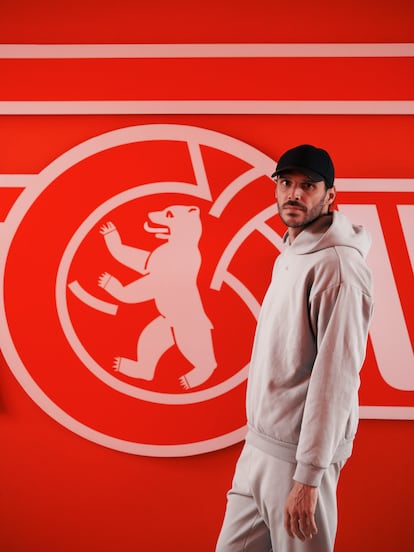
Antonio Hurtado (Puertollano, 1959) was one of those responsible for the arrival of Zingler. Hurtado had emigrated at the age of 13 to Duisburg, where his parents worked. After studying Industrial Engineering, in 1999 he landed in Berlin and began working as manager of BSR (Berliner Stadtreinigung), the municipal waste collection company, which sponsored the lower categories of the team. Elected by the members' assembly, in 2004 he joined the club's supervisory board, the body in charge of appointing the president. “It was a catastrophic situation. Zingler preferred only to serve on the board of directors. But I was able to convince him. The first seasons he put money out of his pocket.”
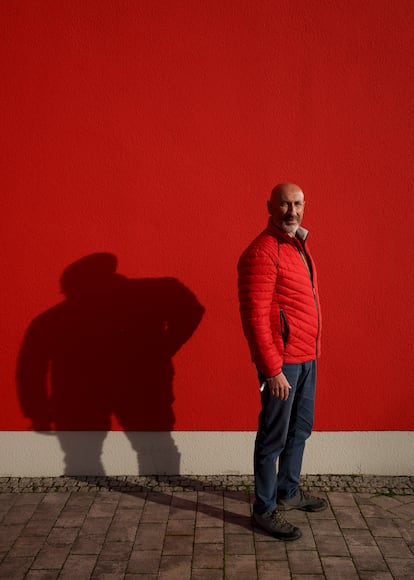
“When I entered the club, the pitch looked like a pasture for cows. But I could see from the first moment the love of those fans for their team: very humble people who gave up their vacations to buy their annual season ticket.” A unionist since his grandfather took him to the countryside when he was seven years old, Dirk Zingler (Königs Wusterhausen, Brandenburg, 1964) was then the general director of Die Logistiker, a successful transport company with 300 employees, which he began to combine with the management of the club. . “Our survival was threatened. We had to fight for our stadium. That was the key to improving.”
In 2008, the authorities were on the verge of closing it because it did not meet the requirements. The club asked for help from companies in the district (which donated the materials) and from the fans. More than 2,300 volunteers collaborated, investing 140,000 hours of unpaid work. He who knew how to paint, painted, and he who knew how to form, form. And whoever didn't, grabbed the shovel. That was the case of Arbeit. “I asked for three days of vacation from my old job to help out. They had me dig to lay the foundation. People told the coordinator: 'I have never built a stadium, but if you tell me what I have to do
, I will try it.'
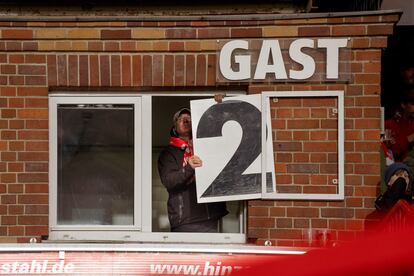
The field, which is one of the smallest in the Bundesliga, with 22,012 spectators (18,395 standing and 3,617 seated), today belongs to the partners, because in 2011, to finance the renovation of the main stand, they were put up for sale. actions (500 euros) that avoided giving their name to a sponsor. “With a maximum of 10 actions per person,” explains Arbeit. “If not, a millionaire could have come and bought them all.” Now a future expansion to 37,770 locations has been approved.
But how can a club like this survive in today's football? “We know we can't win a money dispute. If you have less money, you will have to make better decisions,” admits the president. Arbeit seconds him: “When we played against Madrid, their leaders told us that they did not know how they were going to compete in the next decade with Saudi Arabia. If Real Madrid says that, imagine us.”
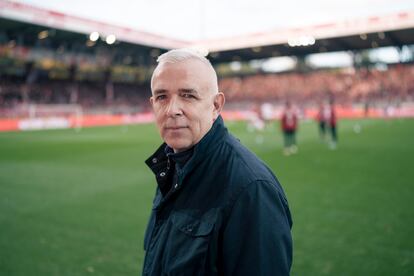
Christopher Trimmel (Oberpullendorf, Austria, 1987) signed for Unión Berlin in 2014 and is today the captain. “When you know the values and work ethic of this place, it is very easy to integrate. I think my biggest problem here was finding housing.” He now resides in Mitte, in the center of Berlin. “I like to have everything at hand. “For me this is like a family: every member matters.”
On Saturday they play against Eintracht Frankfurt and the Wuhlheide forest surrounding the Alten Försterei turns red and white. Nearby bars such as Union Tanke and Abseitsfalle are packed early in the morning. And two hours before the opening whistle, the Waldseite stands, the most bustling of all, are already full. To the right, in a corner, there is a manual marker that is still used more out of tradition than necessity. Behind the other corner, the adjacent biergarten sells beers as if there were no tomorrow. When the players go out to warm up, the Eisern Union plays, the official anthem sung by Nina Hagen, the muse of German punk. “Who doesn't let the West buy them? “The union of iron!” reads one of her stanzas, shouted at the top of her voice and supported by an endless drumbeat. Microphone in hand, Arbeit, today in his role as speaker, presents the starting eleven from the central circle.
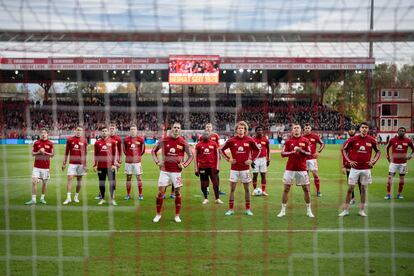
One of the regulars in the stands is Silvio Titzmann (Ludwigsfelde, Brandenburg, 1975). “When I came to Berlin after reunification I was looking for something that combined football with my eastern identity,” he explains before entering the field. “When we were relegated to the fourth division we faced my hometown team, Ludwigsfelder FC. We had never been so low and, although there were thousands of followers, it was a bit of a sad atmosphere.” He is a season ticket holder, so each ticket costs 13.50 euros. And for the Champions League he has purchased a pack for the three group stage matches for 75 euros. “Union is a romantic island within the ultra-capitalist sea of professional football. We are between the nostalgia of being a humble neighborhood team and being part of a business. For us, playing in first class is a gift, but I don't want to lose it,” he reasons. Titzmann is excited when talking about the historic promotion to first class, in 2019, something he had never achieved before. “I still get goosebumps. When the final match ended, it seemed like an orgy!”
Minute and result today at the Alten Försterei? Goal against Unión in the second minute. Great way to start. The score fell to 0-2 in the 14th minute. Any normal fan would have significantly reduced the decibels. It is not the case. This is the ultimate alloy between man and machine, a mensch-maschine forged exclusively for animation. Things didn't even slow down when the third and final goal was conceded. Perks of the job, some will think. Five minutes after the end, no one has left yet. The staff li
nes up in front of the Waldseite to thank them for their support. Arbeit, at the microphone, bids farewell to the fans: “Get home safely.”
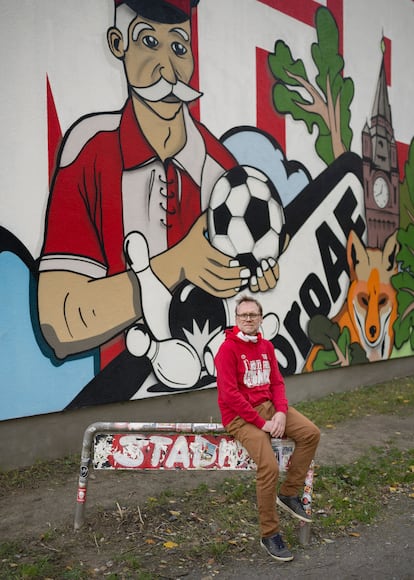
A couple of weeks later, Urs Fischer left the bench after five years of success. The Swiss coach promoted the club to first class and qualified them consecutively for the Conference League, Europa League and Champions League. He will be replaced by Croatian coach Nenad Bjelica. In another previous decision, also somewhat controversial, the board had given up its own field in the group stage of the Champions League to play on the other side of the city. With triple the capacity, the Olympic Stadium is the home of Hertha Berlin, the most traditional team in the west, which is now slumbering in the second division. “UEFA requested 3,000 seats for sponsorships and official commitments. And those are almost all of us at our headquarters,” argues Doblaré. “The entrance would have had to be taken away from very senior members to give it to UEFA. And for Unión, football is just an excuse to generate community.”
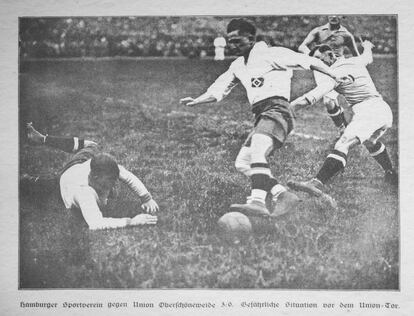
This is attested to by one of the club's maxims, “The strong help the weak,” which spearheads the social projects of its foundation. Or clubs like Grenzenlos Eisern, which collects donations to help the homeless. Or the famous meeting every December 23 at the Alten Försterei to sing carols (in 2022 30,000 people attended). Or that wonderful nonsense that happened during the 2014 World Cup in Brazil. That summer a giant screen was installed on the field and members were allowed to bring their chairs from their homes to watch all the games from the grass. “I brought it too,” Arbeit recalls. “That was a business for the local furniture stores, because no one took their sofa back. “They all stayed there.”
Subscribe to continue reading
Read without limits
_
#Union #Berlin #romantics #European #football